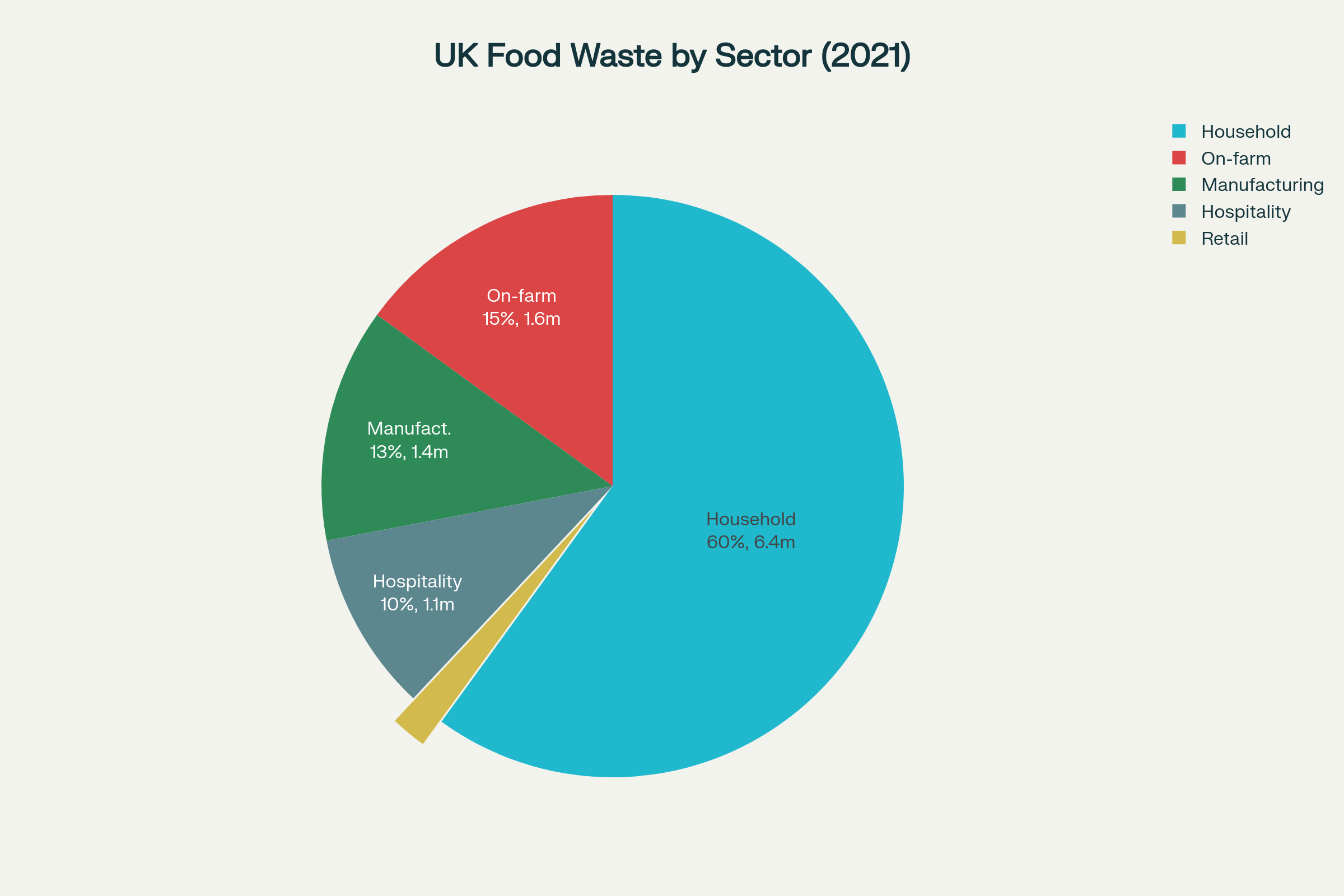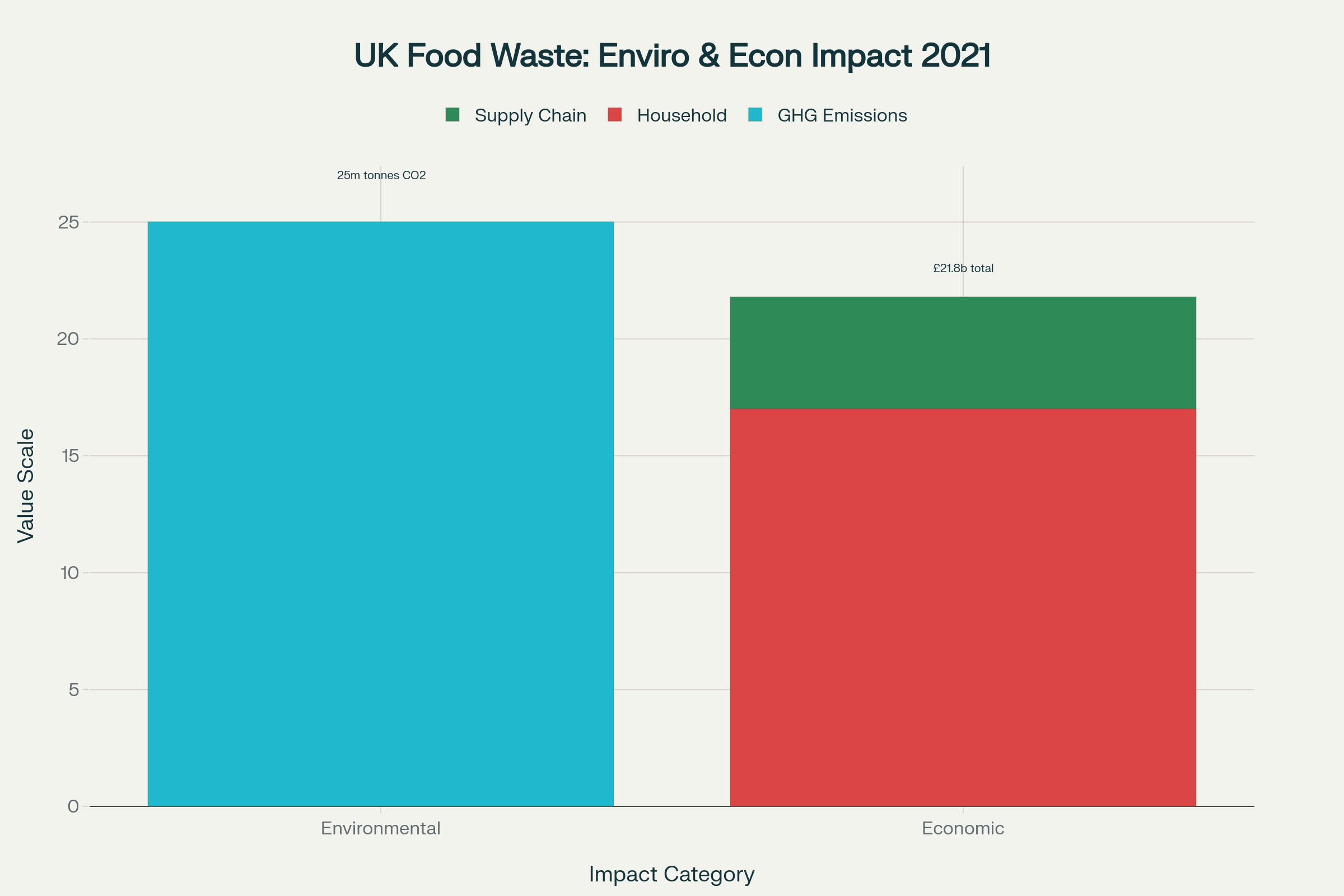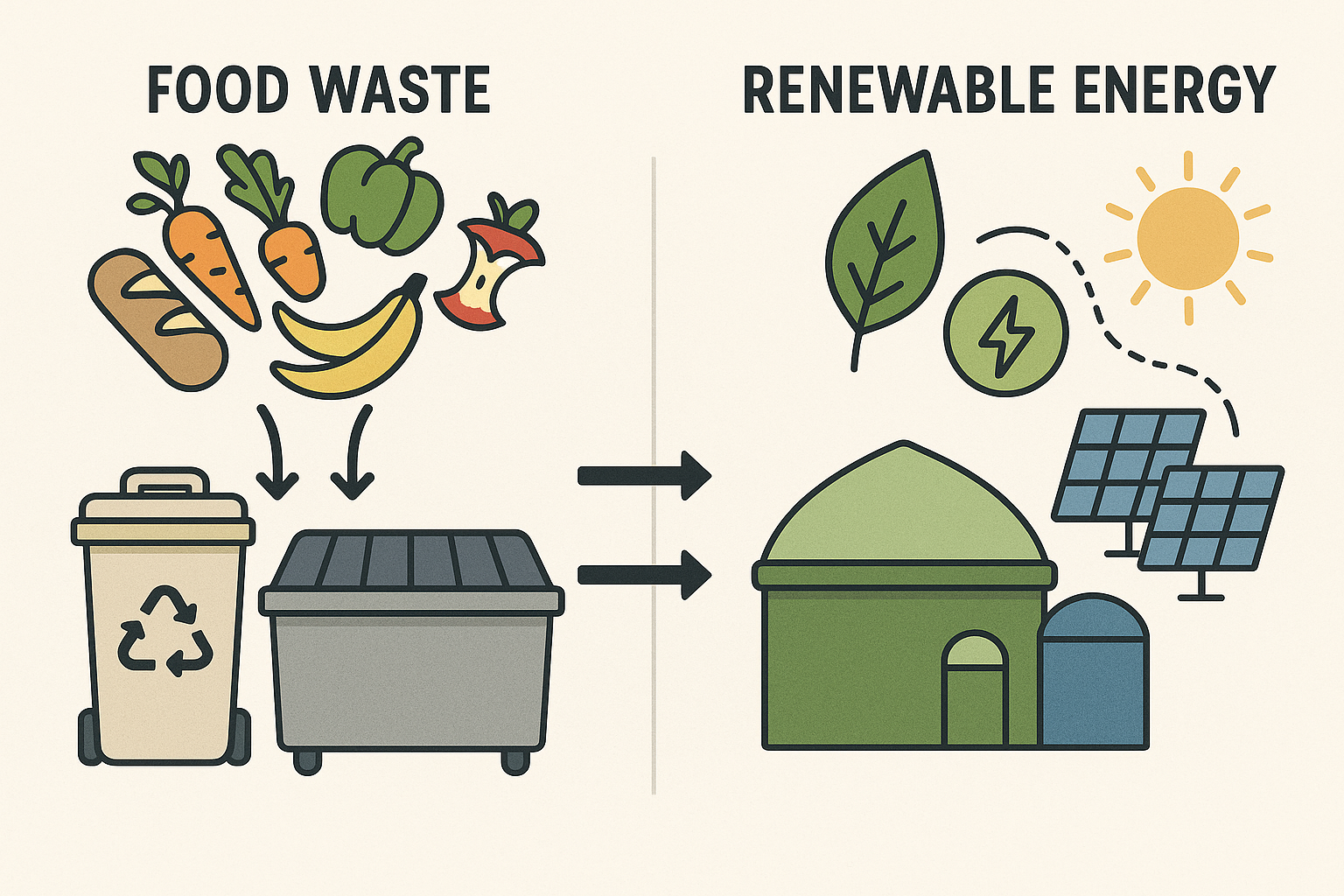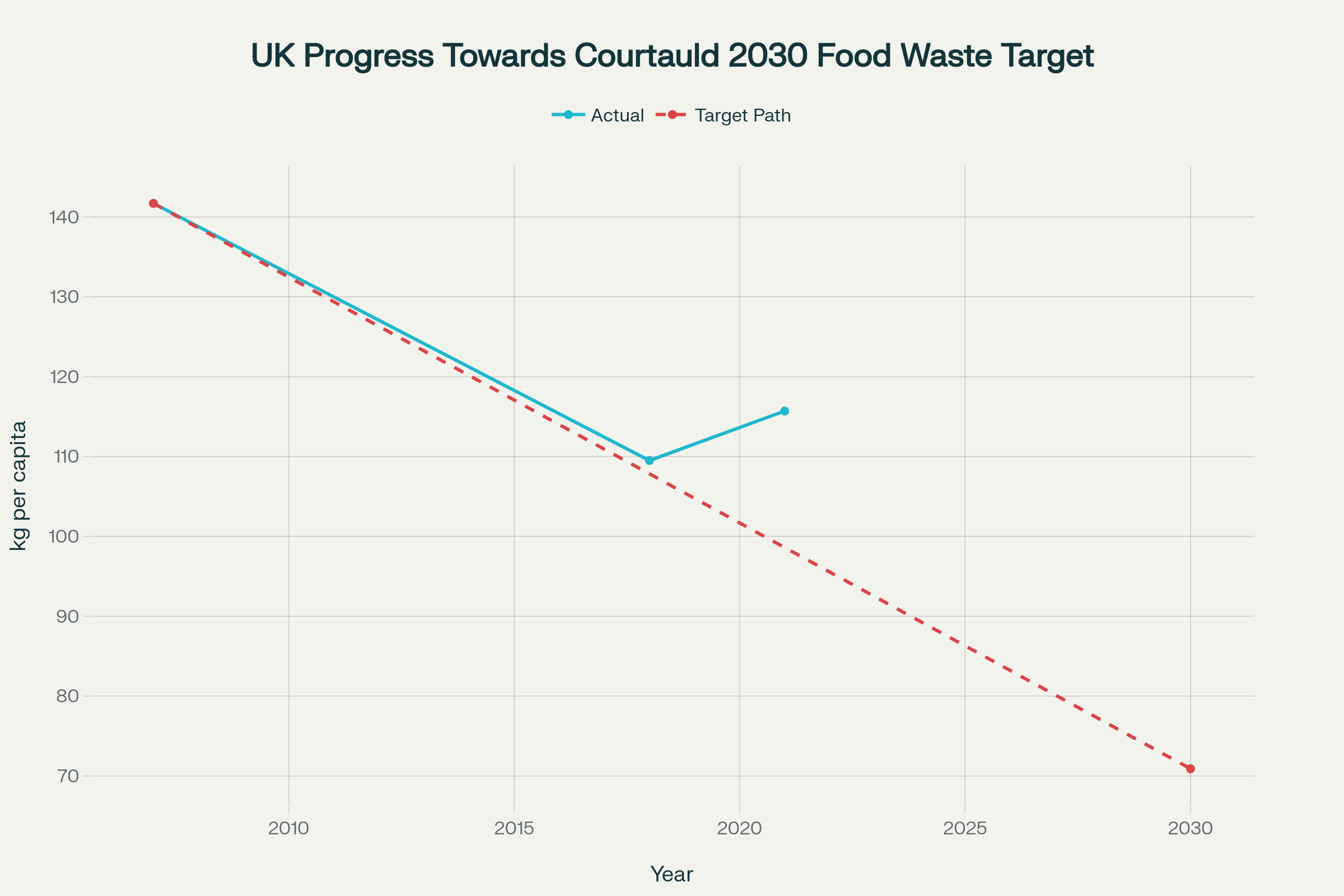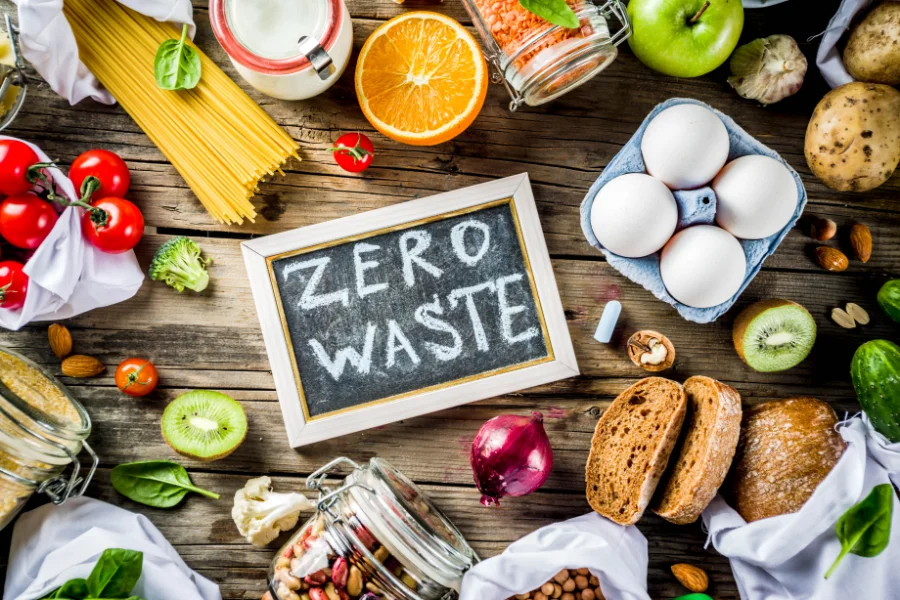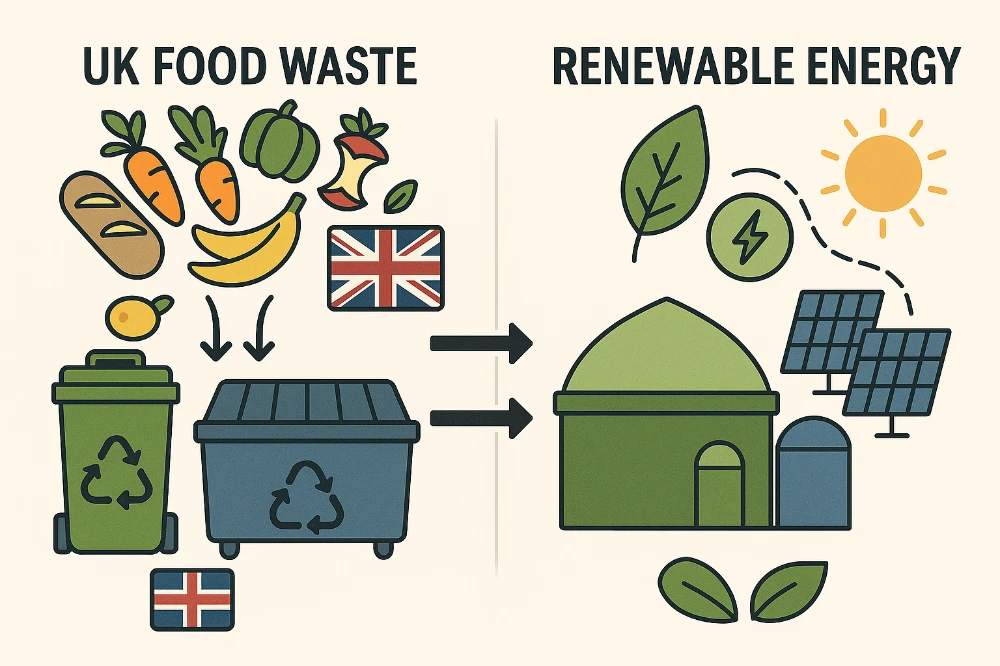
The Scale of Food Waste Crisis in the UK
The United Kingdom faces one of Europe’s most significant food waste challenges, with 9.5 to 10.7 million tonnes of food wasted annually. This staggering amount suffices to feed over 30 million people each year, yet 8.4 million people in the UK live in food poverty. The economic impact is equally devastating, with food waste costing the UK economy approximately £19-21.8 billion annually.
Where Food Waste Occurs
Food waste in the UK originates from multiple sources across the entire food supply chain:
-
Households: 60-70% (6.4-6.7 million tonnes)
-
Manufacturing: 13-16% (1.4 million tonnes)
-
Hospitality & Food Service: 10-12% (1.1 million tonnes)
-
Retail: 2-3% (0.2-0.3 million tonnes)
-
On-farm: 15% (1.6 million tonnes)
Remarkably, 67% of all UK food waste (6.4 million tonnes) was edible when discarded, indicating a massive potential for waste reduction through better management practises.
The Most Wasted Foods in the UK
Analysis of food waste data reveals five key categories dominating UK waste streams:
| Food Item | Annual Waste | Key Causes |
|---|---|---|
| Bread | 900,000 tonnes | Over-purchasing, storage issues |
| Potatoes | 750,000 tonnes | Aesthetic standards, overbuying |
| Milk | 490,000 tonnes | Short shelf life, portion misjudgment |
| Bananas | 190,000 tonnes | Over-ripening, cosmetic rejection |
| Salad & Vegetables | 175,000 tonnes | Poor storage, retailer standards |
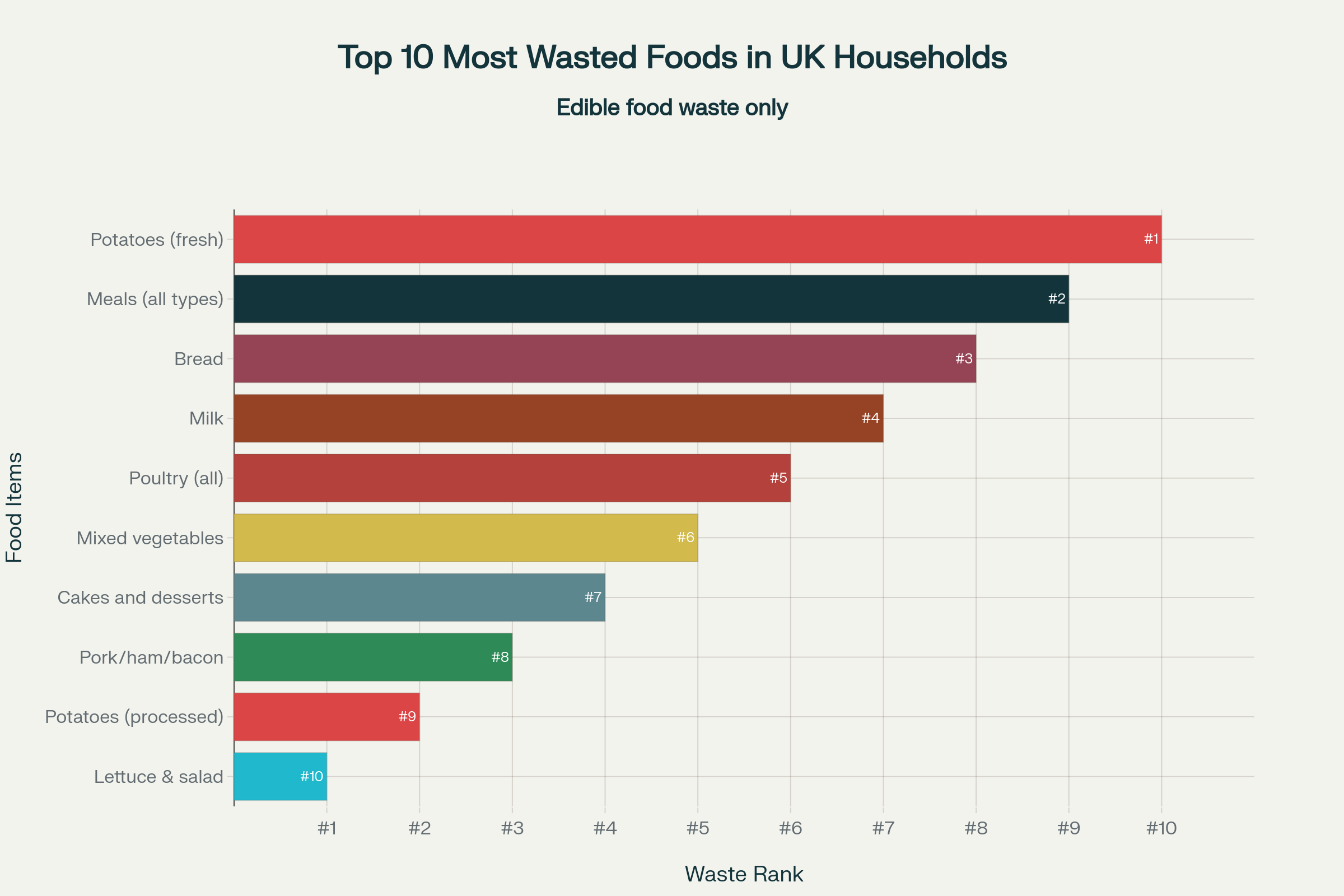
To put this in perspective, UK households waste the equivalent of 24 million slices of bread and 5.9 million glasses of milk daily.
Environmental Impact of Food Waste
Food waste represents one of the UK’s most significant environmental challenges, generating approximately 25 million tonnes of CO2 equivalent emissions annually – representing 3-5% of the UK’s total greenhouse gas emissions.
The Methane Problem
When food waste decomposes in landfills, it produces methane, a greenhouse gas 25 times more potent than CO2. This makes food waste diversion from landfills crucial for climate change mitigation efforts.
Resource Waste
Beyond emissions, food waste represents enormous resource waste:
-
Water footprint: 27 litres per capita daily for avoidable food waste
-
Land use: Equivalent to 0.33 m² of cropland per tonne of food waste
-
Energy: All energy used in production, processing, and transport
Root Causes of Food Waste
Understanding why food waste occurs is essential for developing effective reduction strategies:
Supply Chain Issues
-
Overproduction and demand miscalculation
-
Aesthetic standards rejecting “imperfect” produce
-
Inadequate storage and handling infrastructure
-
Supply/demand mismatches in volatile markets
Consumer Behaviour
-
Over-purchasing and impulse buying
-
Poor meal planning and portion estimation
-
Best-before date confusion leading to premature disposal
-
Inadequate storage knowledge at home
Industry Practises
-
Strict cosmetic standards by retailers
-
Overstocking to ensure full shelves
-
Promotional offers encourage excessive purchasing
-
Limited redistribution infrastructure
Food Waste to Energy: The UK’s Growing Solution
The UK has developed one of the world’s most advanced food waste-to-energy sectors through anaerobic digestion (AD). This process transforms organic waste into valuable resources while preventing harmful methane emissions.
How Anaerobic Digestion Works
Anaerobic digestion breaks down food waste in environments without oxygen, producing two valuable outputs:
-
Biogas: Primarily methane, used for electricity generation or upgraded to bio-methane
-
Digestate: Nutrient-rich fertiliser for agricultural use
Current UK Capacity
The UK’s anaerobic digestion infrastructure has grown substantially:
-
730+ operational AD plants nationwide
-
2,800+ MW of biogas capacity
-
21 TWh of biogas produced annually
-
Enough bio-methane to heat 4.5 million homes
Energy Production Potential
Despite this capacity, only 1.8 million tonnes of the UK’s 9.5 million tonnes of annual food waste is currently recycled through AD, indicating enormous untapped potential for energy recovery.
Environmental Benefits
AD provides multiple environmental advantages:
-
Prevents methane emissions from landfill decomposition
-
Generates renewable energy, reducing fossil fuel dependence
-
Produces organic fertiliser supporting sustainable agriculture
-
Reduces landfill burden and associated environmental impacts
Food Waste to Animal Feed: Circular Economy in Action
Converting surplus food into animal feed represents another crucial waste diversion strategy, with the UK already processing 660,000 tonnes of former foodstuffs as animal feed annually, worth £110 million. Research indicates the potential to increase this to 800,000 tonnes.
Benefits of Food-to-Feed Conversion
Converting food waste to animal feed offers multiple advantages:
-
Environmental benefits: Reduced methane emissions, lower land use impact
-
Economic advantages: Cost reduction of 70% compared to traditional feeds
-
Resource efficiency: Utilises nutrients that would otherwise be wasted
-
Regulatory compliance: Classified as waste prevention, not waste management
Key Technologies
Several innovative approaches are being developed:
-
Enzyme-fermentation processes for restaurant food waste
-
Microbial protein production from organic waste streams
-
Insect-based conversion using black soldier fly larvae
-
Traditional processing through drying, pelleting, and fermentation
Regulatory Framework
UK regulations support food-to-feed conversion while ensuring safety:
-
Foods past ‘Best Before’ dates can be used, if quality is maintained
-
‘Use By’ dated foods cannot be used unless frozen before expiry
-
Comprehensive traceability required throughout process
-
WRAP guidance provides a detailed compliance framework
Best Before Dates and Food Waste
Confusion around date labelling contributes significantly to UK food waste, with best before dates being a major factor in disposal decisions.
Understanding Date Labels
The UK uses two primary date labelling systems:
| Label Type | Meaning | Post-Date Safety |
|---|---|---|
| Use By | Food safety date | Cannot be consumed after (unless frozen before) |
| Best Before | Quality indicator | Safe to consume if stored correctly |
The Confusion Problem
Research reveals widespread misunderstanding of date labels:
-
Many consumers treat ‘Best Before’ as a safety date
-
Food is discarded based on dates rather than sensory assessment
-
Educational interventions can significantly reduce date-related waste
Industry Response
Major retailers and food companies are addressing date labelling issues:
-
Removing best-before dates from fresh produce
-
Improving label clarity with storage guidance
-
Staff training programmes for retail workers
-
Consumer education through Love Food Hate Waste campaigns
Business Benefits of Food Waste Reduction
Reducing food waste offers substantial benefits for UK businesses across multiple dimensions:
Financial Benefits
-
Direct cost savings through reduced food purchasing
-
Waste disposal cost reduction with lower collection fees
-
Revenue generation from surplus food sales to animal feed processors
-
Insurance cost reductions through improved risk management
Environmental Advantages
-
Carbon footprint reduction contributing to net-zero targets
-
Resource efficiency improvements
-
Circular economy participation and development
-
Environmental compliance with emerging regulations
Corporate Social Responsibility (CSR)
-
Community engagement through food redistribution programmes
-
Brand reputation enhancement among environmentally conscious consumers
-
Employee satisfaction through meaningful sustainability initiatives
-
Supply chain sustainability improvements
Regulatory Compliance
-
Mandatory food waste recycling compliance (England Environment Act 2021)
-
Preparation for mandatory reporting requirements expected by 2025
-
Courtauld Commitment 2030 participation
-
UN SDG 12.3 contribution (50% food waste reduction by 2030)
Government Initiatives and Support
WRAP and Love Food Hate Waste
The UK government supports food waste reduction through WRAP (Waste & Resources Action Programme) and its Love Food Hate Waste campaign:
-
Operating since 2007 with proven impact
-
21% reduction in household food waste achieved
-
£500 food saved for every £1 invested in campaigns
-
Global leadership in food waste prevention
Legislative Framework
Recent and upcoming legislation strengthens the UK’s approach to food waste:
-
Environment Act 2021: Mandatory food waste separation for businesses
-
Simpler Recycling Scheme: Universal food waste collection by 2026
-
Potential mandatory reporting: Expected decision by mid-2025
-
Food waste hierarchy: Prioritising prevention, redistribution, and recovery
Targets and Commitments
The UK has established ambitious food waste reduction targets:
-
20% reduction by 2025 (government target)
-
50% reduction by 2030 (WRAP target, aligned with UN SDG 12.3)
-
Net zero by 2050 with food waste reduction as key component
Implementing Food Waste Reduction Strategies
For Businesses
Effective food waste reduction requires systematic approach:
1. Target Setting
-
Establish specific, measurable food waste reduction targets
-
Align with industry commitments (Courtauld 2030)
-
Integrate with broader sustainability goals
2. Measurement and Monitoring
-
Implement comprehensive food waste tracking systems
-
Use WRAP’s measurement methodologies
-
Regular reporting and progress assessment
3. Action Planning
-
Address root causes through process improvements
-
Staff training and awareness programmes – We (Refresh Surplus) also offer this service in 1-hour slots.Providing insights and answering questions in a remote call format. Please use our contact page to enquire about this.
-
Develop partnerships surrounding surplus food redistribution with companies such as Refresh Surplus.
The Future of Food Waste Management
The UK’s food waste management sector continues evolving with emerging technologies and policies:
Technology Innovations
-
AI-powered demand forecasting to reduce overproduction
-
Smart sensors for real-time freshness monitoring
-
Blockchain traceability for surplus food redistribution
-
Advanced biogas upgrading for renewable energy production
Policy Developments
-
Extended producer responsibility for food packaging
-
Mandatory corporate reporting on food waste levels
-
Carbon pricing mechanisms including food waste emissions
-
International cooperation on global food waste reduction
Market Opportunities
-
Growing biogas sector with government support
-
Expanding plant-based alternatives reducing resource intensity
-
Surplus food platforms connecting waste generators with users
-
Circular economy business models creating new value streams
Food waste represents both a significant challenge and a tremendous opportunity for the UK. Through the combined efforts of businesses, government, and consumers, the nation can transform this waste stream into valuable resources while addressing hunger, reducing environmental impact, and building a more sustainable food system. Companies like Refresh Surplus play a crucial role in this transformation, turning today’s surplus into tomorrow’s solutions.

